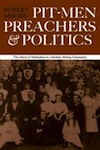One hundred years on from the start of World War One, PAUL SIMPSON remembers the tale of a Durham ILPer and conscientious objector who died in prison for his anti-war beliefs.
 As we approach Remembrance Day on the centenary of the outbreak of the First World War, I am reminded of an account I read a few years ago of a horrifying incident which took place in the County Durham pit village of Quebec where I live, which I think is worth sharing as a striking example of the inhumanity of the 1914-18 war.
As we approach Remembrance Day on the centenary of the outbreak of the First World War, I am reminded of an account I read a few years ago of a horrifying incident which took place in the County Durham pit village of Quebec where I live, which I think is worth sharing as a striking example of the inhumanity of the 1914-18 war.
JG Winter was a young miner, a talented footballer and a Methodist who was active in his local Independent Labour Party. When the war broke out, his Christian and socialist beliefs meant that he could not bring himself to play any part in the killing of others, and so he became a conscientious objector.
As a result, he was imprisoned in Wormwood Scrubs in London, where he was beaten to death by prison officers.
But the horror did not end there. When he was buried in the local churchyard, his funeral procession was attacked by a violent mob who threw stones at the coffin and shouted abuse at the so-called ‘pro-German’ mourners. It’s hard to imagine a more grotesque and tragic scene.
So it is vital that we also remember those like JG Winter, who made up an equally brave minority of people who stood for peace and for the freedom of individuals not to be compelled to ‘kill or be killed’ by the government of the day – whatever the consequences for themselves.
Many lost their jobs and reputations. Many lost their friends, family and relationships. Many lost their liberty, and were routinely subjected to mock executions and beatings during their time in prison. And some, like young JG Winter, even lost their lives.
Despite recent attempts by the government and their friends in the media to revive the old myths of ‘dulce et decorum est pro patra mori’, history has vindicated those who saw the war for what it really was and decided they would have no part in it.
As the last surviving veteran, Harry Patch put it, the 1914-1918 war was ‘organised murder and nothing else’.
—-
 The source for the incident is Robert Moore’s Pitmen, Preachers and Politics (1979).
The source for the incident is Robert Moore’s Pitmen, Preachers and Politics (1979).
More articles about ILPers’ opposition to World War One can be found here.



16 November 2014
War veteran, Harry Patch, was spot-on, war is organised murder but those who do the organising and are responsible for mass murder hardly ever suffer the consequences themselves.
How ironic, then, that while the military, assorted Colonel Blimps and establishment figures, exemplified by our brave, Gung-ho Prince Harry (a descendent of the donkeys who sent the lions over the top) love dressing up in uniform, flashing their medals and taking salutes at the Cenotaph to the sound of marching feet and Elgar’s ‘Enigma Variations’, many of those who did make it back from the trenches, couldn’t wait to get out of uniform and to forget about a vile war and the horrors they had experienced and gone through.
Strange isn’t it, that those who vote for war and make the case for weapons of mass destruction, who are unfussed about sending the plebs to war and who pontificate and rabbit-on incessantly about the need to defend liberal values, and who justify military intervention on the basis of the good fighting evil, by depicting our troops as the bravest of the brave and our military as the best, and always in contrast to the cowardly and barbarian Hun, Jerry, Jap, Commies, Taliban, Russkie, Isis, et al (the names change over time but the narrative remains the same) are the ones who often get the medals, fancy titles, the fawning gratitude of a grateful nation and who benefit financially from the UK’s military industrial complex and the maintenance of a robust defence budget. So it’s surely not coincidental that (unlike those who are sent to do the fighting) most wars and foreign adventures happen to dovetail neatly with establishment, corporate and big money interests.
When you look beyond the spectacle, stirring music, prayers and warm words associated with Remembrance Day, and the understandable desire for ordinary people to show respect for family and for those who made the ultimate sacrifice for the country and people they loved, we are left with an annual ritual that (to my mind) is great theatre but which nevertheless reinforces our conservative culture, UK nationalism and the raison d’être for military spending and occasional wars.
And while the Tower of London poppies were in their own way a moving tribute to fallen soldiers and made for stunning images, and became a major focal point, a must-do-visit during centenary Remembrance Day week, these sentimental images are more akin to Constable, the ubiquitous chocolate box and a Hollywood version of war. And talking of chocolate and Hollywood, what are we to make of the latest Sainsbury’s marketing advert which depicts a (nano second) version of this truly horrific four-year war in the most romantic, sentimental and syrupy way possible? It certainly pulls at the heart strings and will undoubtable be good for business and for Sainsbury’s plc (an opinion admittedly unshared by many, even my own family). But as some of the money from the commercial enterprise will find its way into the bank account of the Help the Heroes charity – that makes it OK then.
But none of this sentimental nonsense would matter one jot if, 99 years after the first Remembrance Day ceremony in 1915, there had been a fundamental change in the mind-set and behaviour by our political leaders, establishment figures, celebrities and opinion formers. There hasn’t and our political representatives continue to send young people (mostly working class soldiers) to fight the good fight abroad, and always for the same dodgy reasons. And when they return in coffins, they ensure their names are enshrined in concrete and added to the list of the glorious dead.
Are we seriously expected to believe that prime ministers Blair, Brown and Cameron sent hundreds of British troops to die in Iraq and Afghanistan for purely humanitarian reasons, for the common good, and to further peaceful co-existence between nations and to protect a free world?
From this perspective, don’t you think it sad that otherwise thoughtful and compassionate Labour leaders like Ed Miliband, and before him Michael Foot (well all political leaders), feel it would be political suicide to miss the annual day-trip to the Cenotaph, and that wittingly or unwittingly they perpetuate our conservative culture and the myth that everything that our military does is good, and for honourable ends, and always within the standards of international law and the Geneva Conventions on the conduct of war, and that UK troops are always engaged in the universal struggle of good versus evil and in defence of freedom, democracy and western values (sic).
And when it comes to Remembrance Day woe betide anyone who fails to conform to this national day of mourning and like Michael Foot (horror of horrors) use the wrong dress code, or like Wigan footballer James McClean, decline to display a red poppy on his team shirt, resulting in bullying by the right-wing press and tabloids. Foot and McClean found themselves vilified as disrespectful and unpatriotic. That is what happened to composer and conductor Peter Maxwell Davies (he is a Sir but I prefer not to recognise these meaningless titles) who famously said, “But I feel Remembrance Day and the whole poppy appeal has been hijacked by politicians for propaganda purposes to support the unjustified wars in Afghanistan and Iraq.”
So in this regard, I feel proud to be an ILPer and able to wear a white poppy on Remembrance Day and by this small token of my views to be loosely associated with those brave individuals (ILPers, pacifists and people of faith) who sacrificed their own freedom and reputations with family, friends and communities during this horrific and totally unjustifiable war. And especially people like Duham ILPer JG Winter who also paid the ultimate sacrifice and was murdered by the British State for his beliefs. No doubt, it is just another unsolved, unpunished and unrecorded murder crime statistic.
In this regard, I often tell my own family (for what good it does me) that if they want to remember war, any war, to play the music of American folk singer and political activist Pete Seeger, and to listen to the words of his song “Where have all the flowers gone?”:
Where have all the flowers gone, long time passing?
Where have all the flowers gone, long time ago?
Where have all the flowers gone?
Young girls have picked them everyone.
Oh, when will they ever learn?
Oh, when will they ever learn?
That to my mind is what Remembrance Day should be about.
10 November 2014
Reading Robert Moore’s book it would seem that the opposition to the war came almost solely from within the Primitive Methodist Church. The Methodist attitude supported the war as a just and righteous cause and some even sat on recruitment committees.
I am struck how much religious and political strength would have been needed to be a Conscientious Objector, going against the crowd especially in those close-knit Durham mining communities where they were being held up as shirkers, cowards and traitors.
Three miners’ lodges (East Hetton, Hebburn and Edmondsley) called on the DMA (Durham Miners’ Association) to expel COs, throw out officials who sympathised and asked miners not to work with them.
You can also see how important the solidarity of comrades was in sustaining their position. In those days the whole community would normally have turned out to support the bereaved and out of respect for the deceased.
But only ILP members attended JG Winters’ funeral. The crowd booed the cortege and stones were thrown at the coffin. When the coffin was lowered into his grave they were catcalled by those at the cemetery gate in contrast to the repeated singing of ‘The Red Flag’ by his comrades.